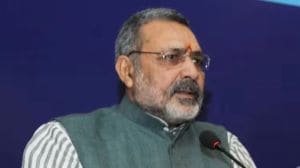Govt puts foot down on Bechtel
With barely a few days left for the Dabhol arbitration hearings to begin in London, the Indian side has put its foot down and has asked Bech...

With barely a few days left for the Dabhol arbitration hearings to begin in London, the Indian side has put its foot down and has asked Bechtel to accept the terms offered to GE to settle the Dabhol issue.
During the talks held on Monday, the Indian side however has sweetened the deal for Bechtel by broadening the scope for third party claims but has asked Bechtel to absorb the tax on the settlement amount like GE did.
On third party claims, one of the main issues that Bechtel and the Indian side did not meet eye to eye, the latter said all such claims have to be made under the bilateral investment treaties only.
It is learnt that Bechtel, instead of rejecting the Indian side’s stand on these points as well as on the payment terms, has informed them that they would get back in a couple of days time. Bechtel is the only party which is yet to come on board on the settlement issue as GE, OPIC and the foreign banks have all come to an agreement on the settlement offer made by the Indian side.
In order to facilitate the share transfer, GE and the government would put 10 per cent of their equity in the Dabhol venture that would be transferred to an altogether new special purpose vehicle called New Age Power Company (NAPC) launched by Rothschild (advisors for the revival process) a few days ago. This company is registered in Mumbai.
Like GE, Bechtel’s settlement amount would also be paid in two tranches. Fifty per cent of their settlement amount of $160 million would be made upfront through the Maharashtra Power Development Corporation Ltd.
Thereafter Bechtel would also transfer their 10 per cent share in Dabhol to NAPC.
However, the balance amount would be given once they withdraw their claims in the New York Bankruptcy court and allow the transfer of GE-Becthel’s 65 per cent stake in Dabhol to NAPC. While GE-Bechtel hold 10 per cent each in the Dabhol project, these two companies, based on a US bankruptcy court order also blocked Enron’s 65 per cent stake taking their combined stake to 85 per cent.
Parallel to these discussions, in another development, the Indian side is to sign an agreement with both US government promoted Overseas Private Investment Corporation (OPIC) and the foreign lenders on July 8 to settle their claims in the Dabhol project.
Sources said initially OPIC was to be paid its settlement amount on July 5 but now the deal has been clubbed with the settlement of foreign debt.
This payout would be through another new company floated by the financial institutions and banks called the Gas & Power Investment Company (GIPCL) in which State Bank of India, ICICI, IDBI, Canara Bank, IFCI all hold an equity of 99.95 per cent (divided equally), while the balance 0.05 per cent is held by the law firm Amarchand Mangaldas & Suresh A Shroff.
Under the deal, a total of $228 million is to be paid to OPIC — all of which is a down payment. As OPIC had lent both in the form of debt and insurance, the Indian financial institutions (IFIs) and banks would be paying $127 for their debt exposure in the Dabhol project while $111 would be towards the political risk insurance (PRI) that OPIC had extended to GE-Bechtel. PRI is a financial instrument used by the shareholders to guarantee their investment in the Dabhol venture.
Apart from OPIC’s exposure, GIPCL would also be buying out the foreign banks exposure in the project which itself is estimated to be over $230 million.
While the total amount is to be paid by the IFIs and banks, thereafter, GIPCL would be raising central government guaranteed bonds to meet these payouts. The Life Insurance Corporation of India would subscribe to these bonds.
As per the settlement and the central government guarantee terms for the Dabhol project, the Centre would be limiting its guarantee to only the offshore debt component and would not extend its guarantee to the PRI claims.



- 01
- 02
- 03
- 04
- 05




























